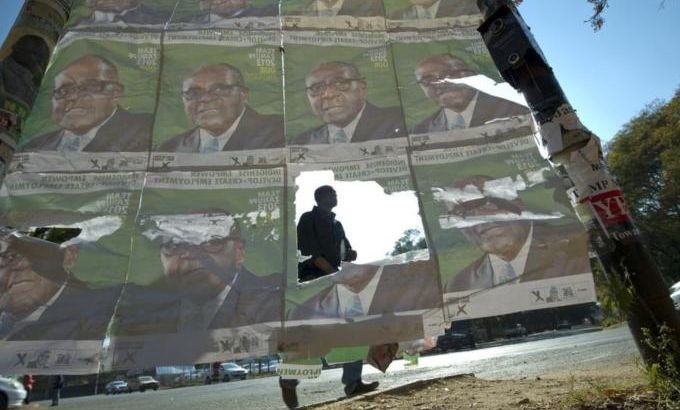Zimbabweans vote amid heavy security
Police deployed to potential election flashpoints as polls open, with president saying he will step down if he loses.

Heavily armed riot police have been deployed in potential election flashpoints in Zimbabwe, as an estimated 6.4 million eligible voters begin to cast their votes.
Prime Minister Morgan Tsvangirai has vowed to push President Robert Mugabe out of office after 33 years in power.
Long queues of people braved a bout of unseasonably cold weather to stand in line from well before dawn on Wednesday.
Al Jazeera’s Haru Mutasa, reporting from the capital, Harare, said that some people had queued since 4.30am to cast their votes because they said it was such an important election.
Mutasa said that people were concerned about the voters roll, which was only made available to the public on Monday.
“They haven’t had the chance to check and see if their name’s actually on that voters roll,” our correspondent
said.
“They are concerned about duplication of names, they’re concerned that a certain number of people are supposedly deceased on that voters roll.”
Parkstone Musarurwa, 27, told Al Jazeera’s Azad Essa, reporting from Harare, that he had queued to cast his ballot since 6am and had not seen any intimidation.
“It’s a cold morning and the environment is so cool, everyone is so happy,” said Musarurwa, who said he was hoping the poll would bring change.
“Nothing’s going to stop me to vote.”
Intimidation threats
Mugabe said before the polls opened at 05:00 GMT that he would step down if he lost and that the army, long the bulwark of his rule, would also respect a win for Tsvangirai.
Tsvangirai, who was forced out of the race in 2008 after 200 of his supporters were killed, said that he took Mugabe’s promise “with a pinch of salt”.
As voting opened in one polling station in the western province of Manicaland, a key swing region, the queue stretched for a kilometre.
State radio said thousands of officers had been sent to the central Midlands province on Tuesday, while trucks of police carrying automatic rifles and grenade launchers patrolled in the restive Harare townships of Highfield and Mbare.
The run-down districts of the capital are hotbeds of support for Tsvangirai and were at the centre of several weeks of post-election violence in 2008, in which 200 people linked to his Movement for Democratic Change (MDC) were killed.
This year’s presidential and parliamentary elections have been marked by allegations of threats and intimidation by security forces, but there have been no reports of violence.
About 6.4 million people are eligible to cast their ballots in the first round of presidential and parliamentary elections.
With no reliable opinion polls, it is hard to tell whether 61-year-old Tsvangirai will succeed in his third attempt to unseat his 89-year-old rival, who has run the southern African nation since independence from Britain in 1980.
Voter irregularities
The MDC and Mugabe’s ZANU-PF party have predicted landslide victories. However, it is possible neither candidate will emerge an outright winner, triggering a September 11 run-off.
Mugabe’s rivals have submitted what they claim is evidence of his plans to rig the vote to regional election observers.
Allies of Tsvangirai presented a sample list of about125 duplicate or questionable voters on the electoral roll to observers from the Southern African Development Community.
Al Jazeera’s Haru Mutasa, reporting from Harare, said Mugabe, who dismissed vote-rigging claims, was confident of winning the election and believed that there will not be a power sharing deal with MDC.
Given the irregularities and problems that have dogged the election process, including failure to publish an electronic voters’ roll, any result is highly likely to be contested, raising the prospect of another long political stalemate.
In 2008, South Africa and other countries in the region negotiated a unity government between Mugabe and Tsvangirai to break a deadlock caused by the MDC’s withdrawal from a second-round runoff because of the violence and killings.
Western election observers have been barred, leaving the task of independent oversight to 500 regional and 7,000 domestic monitors. The final results must be released within five days, but may come sooner.